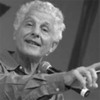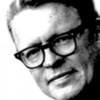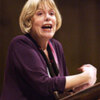Michael D. Coogan
Author of The New Oxford Annotated Bible with Apocrypha: New Revised Standard Version
About the Author
Michael Coogan is director of publications for the Harvard Semitic Museum and professor emeritus of religious studies at Stonehill College. He has also taught at Harvard Divinity School, Wellesley College, and elsewhere. He is the author of The Old Testament: A Historical and Literary Introduction show more to the Hebrew Scriptures, The Old Testament: A Very Short Introduction, and A Reader of Ancient Near Eastern Texts: Sources for the Study of the Old Testament and the editor of The New Oxford Annotated Bible. His most recent book is The Ten Commandments: A Short History of an Ancient Text. show less
Works by Michael D. Coogan
The New Oxford Annotated Bible with Apocrypha: New Revised Standard Version (1991) 2,764 copies, 5 reviews
The New Oxford Annotated Bible, New Revised Standard Version with the Apocrypha (1400) — Editor — 917 copies, 4 reviews
The Old Testament: A Historical and Literary Introduction to the Hebrew Scriptures (2005) 329 copies, 1 review
Eastern Religions: Hinduism, Buddism, Taoism, Confucianism, Shinto (1997) — Editor — 110 copies, 2 reviews
Scripture and Other Artifacts: Essays on the Bible and Archaeology in Honor of Philip J. King (1994) — Editor — 42 copies
The New Oxford Annotated Bible 32 copies
God's Favorites: Judaism, Christianity, and the Myth of Divine Chosenness (2019) 25 copies, 1 review
The New Oxford Annotated Bible With the Apocryphal/Deuterocanonical Books (New Revised Standard) 12 copies
New Oxford Annotated Bible, The: New Revised Standard Version with the Apocrypha, 3rd edition 1 copy
The Old Testament 1 copy
Associated Works
Tagged
Common Knowledge
- Legal name
- Coogan, Michael David
- Birthdate
- 1942-07-30
- Gender
- male
- Nationality
- USA
- Places of residence
- Concord, Massachusetts, USA
- Education
- Harvard University (PhD|1971)
- Occupations
- religious studies professor
biblical scholar - Organizations
- Harvard Divinity School
Harvard Semitic Museum
Fordham University
Boston College
Wellesley College
University of Waterloo (show all 7)
Stonehill College - Awards and honors
- Stonehill's Distinguished Faculty Award (2000)
Members
Reviews
Lists
Awards
You May Also Like
Associated Authors
Statistics
- Works
- 39
- Also by
- 2
- Members
- 6,769
- Popularity
- #3,612
- Rating
- 4.1
- Reviews
- 41
- ISBNs
- 117
- Languages
- 6
















Whenever I read, I recall wise advice from Mortimer Adler in his book How to Read a Book - try to remove yourself from your modern way of thinking and imagine yourself as a person living in the time and place of the characters you are reading about. What would you see and hear? How would you react? When I read the Bible, I felt that I was gaining more knowledge, yet I couldn’t conjure up the sense of relatedness that I felt when reading books like the Epic of Gilgamesh or the Odyssey. There were some biblical stories that moved me either to tears or to anger - but in none was I able to really imagine myself there. I decided to veer slightly off the track of Bloom’s Western Canon and delve into books that provide context for the biblical world. After reading this book, I realized that part of the problem is sweep. The biblical world and its history cover thousands of years and a diverse set of peoples, languages, and religious beliefs. Trying to imagine oneself in the context of the biblical world is like imagining oneself in the expanse of modern time. I could no less imagine myself in the same book as a Renaissance woman and Sally Ride - both of whom lived in a far shorter period of time than the span of the biblical world. In a way, reading The Oxford History of the Biblical World gave a sense of relief.
It is the Israeli religion, which later developed into what we call Judaism that dominates the book. From the earliest creation stories to the overthrow of Jerusalem by the Muslims, the authors show how the religious and legal system of the Jews developed. The book puts each of the Bible’s books in their contemporary contexts. This helps the reader see connections to the broader world in a geography that spanned from Arabia to North Africa and from India to Spain in the Old Testament and from Asia Minor to Italy in the New Testament.
I learned much about the context and development of both Judaism and Christianity. For example, long before Christianity became a separate religion, to the far-away ruling elite in Rome, it would have been indistinguishable from the religion of Israel. If the emperor knew about it at all, and it’s likely that he didn’t, it would have been considered an extremely small, localized movement within the Israeli religion. That it developed into the world’s most popular religion is a testament to the power of its message of redemption and to the brilliance of the early church leaders who codified the texts and built a structure that has endured ever since.
I read this book after I read Robin Lane Fox’s Unauthorized Version. I will review that book separately. But in comparison, the Oxford History is more cut and dry with a serious, scholarly voice. Fox covers similar material but with a twinkle in his eye. For pure enjoyment, his is the superior book. But for sheer breadth and reference, the Oxford book is the one to keep on the shelf.… (more)